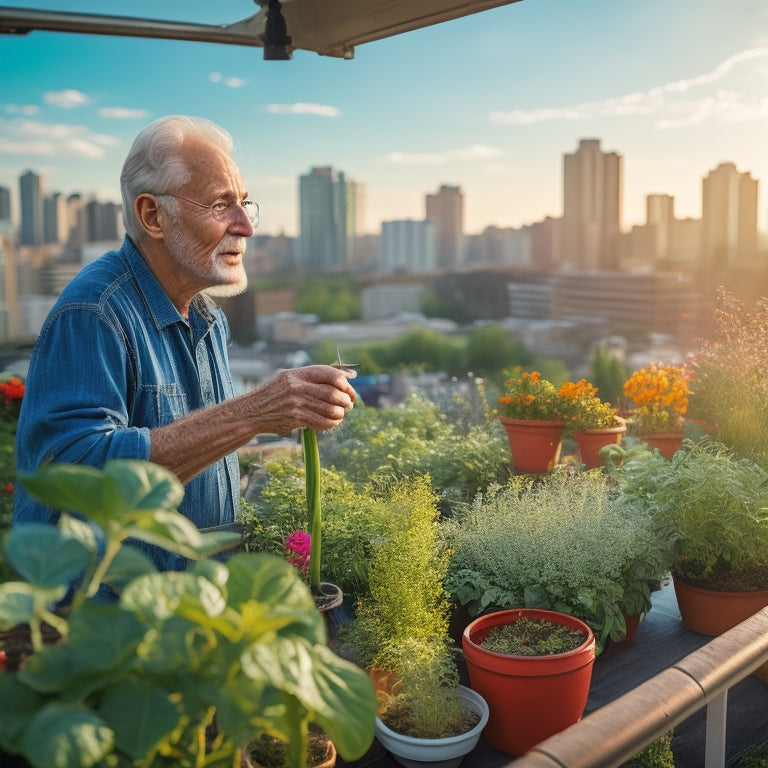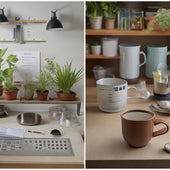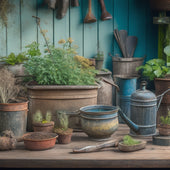
Rooftop Gardening for Seniors: Easy Organic Options
Share
You're ready to reveal the therapeutic benefits of rooftop gardening, tailored to your needs as a senior. Rooftop gardening improves your physical and mental well-being, provides a sense of purpose, and fosters social connections. Choose lightweight containers with adequate drainage, and opt for easy-to-grow organic vegetables like cherry tomatoes and leafy greens. To make gardening less straining, incorporate adaptive tools, raised beds, and senior-friendly techniques. As you get started, remember to maintain your rooftop garden by regularly inspecting irrigation systems, pruning dead plants, and monitoring for pests. With these easy tips, you'll be on your way to a thriving rooftop oasis, and there's more to discover as you grow.
Key Takeaways
• Rooftop gardening improves physical and mental health, reduces chronic disease risk, and fosters social connections among seniors.
• Choose lightweight, space-efficient containers with adequate drainage holes, considering plant type and weight for rooftop safety.
• Start with easy-to-grow, low-maintenance organic vegetables like cherry tomatoes, leafy greens, and herbs, using companion planting and experimentation.
• Incorporate adaptive tools, raised beds, and wide pathways to minimize physical strain and enhance senior accessibility.
• Regularly inspect and maintain the rooftop garden, adjusting irrigation schedules, pruning dead plants, and monitoring for pests using organic control methods.
Benefits of Rooftop Gardening
Regularly tending to a rooftop garden can bring numerous benefits to seniors, including improved physical and mental health, social connections, and a sense of purpose.
As you nurture your plants, you'll notice improvements in your physical health, such as increased mobility and flexibility, as well as reduced risk of chronic diseases. The gentle exercise and fresh air will also boost your mental well-being, reducing stress and anxiety. You'll feel more energized and motivated, which can help combat depression and isolation.
Rooftop gardening also provides opportunities for social connections, whether it's through sharing tips with fellow gardeners or hosting garden parties. You'll feel a sense of community and belonging, which is essential for seniors.
Additionally, tending to your garden gives you a sense of purpose, allowing you to take care of something and watch it thrive. This can be incredibly fulfilling and give you a sense of accomplishment.
Choosing the Right Containers
As you prepare to start your rooftop garden, selecting the right containers is essential to guarantee your plants thrive in their new environment. You want to ascertain your containers provide adequate space for your plants' roots to grow, while also considering the weight and material of the container itself.
-
Lightweight materials: Choose containers made from lightweight materials like plastic, fiberglass, or resin to reduce the overall weight of your rooftop garden.
-
Space-efficient designs: Opt for containers with space-efficient designs, such as vertical planters or hanging baskets, to maximize your rooftop space.
-
Drainage holes: Make sure your containers have adequate drainage holes to prevent waterlogged soil and root rot.
When selecting containers, also consider the specific needs of the plants you'll be growing. For example, if you're planning to grow vegetables, you'll want containers with good aeration and drainage.
Easy to Grow Organic Vegetables
You can now start planting easy-to-grow organic vegetables in your carefully selected containers, enjoying the fresh air and exercise that comes with rooftop gardening. One of the joys of rooftop gardening is being able to grow your own organic produce, and it's easier than you think!
Start with heirloom varieties like cherry tomatoes, leafy greens, and herbs like basil and cilantro. These plants are perfect for seniors, as they're low-maintenance and produce a high yield.
Companion planting is another great technique to keep in mind. By planting certain vegetables and herbs together, you can naturally deter pests and improve growth. For example, plant marigolds with tomatoes to repel nematodes, or basil with peppers to improve their flavor.
Don't be afraid to experiment and try new combinations! With a little creativity and patience, you'll be harvesting fresh, delicious vegetables in no time.
Remember to keep your containers well-watered and fertilized, and enjoy the fruits of your labor!
Senior-Friendly Gardening Techniques
How can you adapt your rooftop gardening routine to accommodate physical limitations or mobility issues that may come with aging?
As you continue to enjoy the benefits of rooftop gardening, it's crucial to reflect on senior-friendly techniques that make gardening more accessible and enjoyable for you.
One way to do this is by incorporating adaptive tools into your routine. These tools can help reduce strain on your body and make tasks easier to manage.
For instance, you can use long-handled gardening tools to reduce bending and straining, or opt for lightweight and ergonomic tools that are easier to grip and maneuver.
To create an accessible design, reflect on the following:
-
Raised beds or containers that are waist-high to reduce bending and straining.
-
Wide, stable pathways that allow for easy navigation.
-
Seating areas or benches for regular breaks and rest.
Rooftop Garden Maintenance Tips
Regularly inspect your rooftop garden's irrigation system to catch any leaks or blockages, ensuring your plants receive the right amount of water without wasting this precious resource. This simple step will save you time and money in the long run. As a senior, you want to enjoy your rooftop garden without worrying about maintenance headaches.
For seasonal maintenance, adjust your irrigation schedule according to the weather. During hot summer months, your plants may need more frequent watering, while in cooler seasons, you can reduce the frequency. Additionally, prune dead or dying plants to prevent the spread of disease and pests.
Speaking of pests, don't forget about pest management. Keep an eye out for common rooftop garden pests like aphids, whiteflies, and spider mites. Use organic pest control methods like neem oil or insecticidal soap to keep these unwanted visitors at bay.
Frequently Asked Questions
Can I Grow a Rooftop Garden in a Shaded Area?
You're not alone - 80% of urban dwellers crave green spaces! Yes, you can grow a rooftop garden in a shaded area; choose shaded plants like ferns, impatiens, or coleus, perfect for urban gardening in low-light conditions.
How Do I Prevent Pests From Entering My Rooftop Garden?
You're wise to worry about pests! Use natural repellents like neem oil and introduce companion planting to deter unwanted visitors. Marigolds, basil, and nasturtiums are great additions to keep pests at bay without harming your rooftop haven.
Are There Any Rooftop Garden Insurance Options Available?
You're wise to contemplate rooftop insurance, as it can protect you from gardening liability. Check with your homeowner's insurance provider to see if they offer add-ons for rooftop gardens, or explore standalone policies for added peace of mind.
Can Rooftop Gardens Be Designed for Wheelchair Accessibility?
As you navigate life's journey, imagine your rooftop garden as a welcoming oasis, where you're free to roam. You can design it to be wheelchair accessible, with wide, smooth pathways and container gardening that brings nature within easy reach.
Do Rooftop Gardens Increase Property Taxes or Value?
You're wondering if your rooftop garden will hike up your property taxes or boost its value. Good news: it's likely to increase property value, while tax implications vary by location, so research local laws to know what to expect.
Related Posts
-

Accurate Measurements for Self-Watering Planters Made Easy
You're about to reveal the secrets of self-watering planters, and it all starts with precise measurements. Begin by a...
-

Accurate Measurements for Self-Watering Planters Made Easy
You're about to reveal the secrets of self-watering planters, and it all starts with precise measurements. Begin by a...
-

Accurate Measurements for Self-Watering Planters Made Easy
You're about to reveal the secrets of self-watering planters, and it all starts with precise measurements. Begin by a...
-

Accurate Measurements for Self-Watering Planters Made Easy
You're about to reveal the secrets of self-watering planters, and it all starts with precise measurements. Begin by a...
-

Accurate Measurements for Self-Watering Planters Made Easy
You're about to reveal the secrets of self-watering planters, and it all starts with precise measurements. Begin by a...
-

Accurate Measurements for Self-Watering Planters Made Easy
You're about to reveal the secrets of self-watering planters, and it all starts with precise measurements. Begin by a...
-

Accurate Measurements for Self-Watering Planters Made Easy
You're about to reveal the secrets of self-watering planters, and it all starts with precise measurements. Begin by a...
-

Accurate Measurements for Self-Watering Planters Made Easy
You're about to reveal the secrets of self-watering planters, and it all starts with precise measurements. Begin by a...
-

Accurate Measurements for Self-Watering Planters Made Easy
You're about to reveal the secrets of self-watering planters, and it all starts with precise measurements. Begin by a...
-

Accurate Measurements for Self-Watering Planters Made Easy
You're about to reveal the secrets of self-watering planters, and it all starts with precise measurements. Begin by a...
-

Accurate Measurements for Self-Watering Planters Made Easy
You're about to reveal the secrets of self-watering planters, and it all starts with precise measurements. Begin by a...
-

Accurate Measurements for Self-Watering Planters Made Easy
You're about to reveal the secrets of self-watering planters, and it all starts with precise measurements. Begin by a...
-

Accurate Measurements for Self-Watering Planters Made Easy
You're about to reveal the secrets of self-watering planters, and it all starts with precise measurements. Begin by a...
-

Accurate Measurements for Self-Watering Planters Made Easy
You're about to reveal the secrets of self-watering planters, and it all starts with precise measurements. Begin by a...
-

Accurate Measurements for Self-Watering Planters Made Easy
You're about to reveal the secrets of self-watering planters, and it all starts with precise measurements. Begin by a...
-

Accurate Measurements for Self-Watering Planters Made Easy
You're about to reveal the secrets of self-watering planters, and it all starts with precise measurements. Begin by a...
-

Accurate Measurements for Self-Watering Planters Made Easy
You're about to reveal the secrets of self-watering planters, and it all starts with precise measurements. Begin by a...
-

Accurate Measurements for Self-Watering Planters Made Easy
You're about to reveal the secrets of self-watering planters, and it all starts with precise measurements. Begin by a...
-

Accurate Measurements for Self-Watering Planters Made Easy
You're about to reveal the secrets of self-watering planters, and it all starts with precise measurements. Begin by a...
-

Accurate Measurements for Self-Watering Planters Made Easy
You're about to reveal the secrets of self-watering planters, and it all starts with precise measurements. Begin by a...
-

Accurate Measurements for Self-Watering Planters Made Easy
You're about to reveal the secrets of self-watering planters, and it all starts with precise measurements. Begin by a...
-

Accurate Measurements for Self-Watering Planters Made Easy
You're about to reveal the secrets of self-watering planters, and it all starts with precise measurements. Begin by a...
-

Accurate Measurements for Self-Watering Planters Made Easy
You're about to reveal the secrets of self-watering planters, and it all starts with precise measurements. Begin by a...
-

Accurate Measurements for Self-Watering Planters Made Easy
You're about to reveal the secrets of self-watering planters, and it all starts with precise measurements. Begin by a...
-

Accurate Measurements for Self-Watering Planters Made Easy
You're about to reveal the secrets of self-watering planters, and it all starts with precise measurements. Begin by a...
-

Accurate Measurements for Self-Watering Planters Made Easy
You're about to reveal the secrets of self-watering planters, and it all starts with precise measurements. Begin by a...
-

Accurate Measurements for Self-Watering Planters Made Easy
You're about to reveal the secrets of self-watering planters, and it all starts with precise measurements. Begin by a...
-

Accurate Measurements for Self-Watering Planters Made Easy
You're about to reveal the secrets of self-watering planters, and it all starts with precise measurements. Begin by a...
-

Accurate Measurements for Self-Watering Planters Made Easy
You're about to reveal the secrets of self-watering planters, and it all starts with precise measurements. Begin by a...
-

Accurate Measurements for Self-Watering Planters Made Easy
You're about to reveal the secrets of self-watering planters, and it all starts with precise measurements. Begin by a...
-

Accurate Measurements for Self-Watering Planters Made Easy
You're about to reveal the secrets of self-watering planters, and it all starts with precise measurements. Begin by a...
-

5 Tips for Shaded Area Gardening Success
To turn your shaded areas into thriving gardens, start by selecting shade-tolerant crops like leafy greens and herbs,...
-

5 Tips for Shaded Area Gardening Success
To turn your shaded areas into thriving gardens, start by selecting shade-tolerant crops like leafy greens and herbs,...
-

5 Tips for Shaded Area Gardening Success
To turn your shaded areas into thriving gardens, start by selecting shade-tolerant crops like leafy greens and herbs,...
-

5 Tips for Shaded Area Gardening Success
To turn your shaded areas into thriving gardens, start by selecting shade-tolerant crops like leafy greens and herbs,...
-

5 Tips for Shaded Area Gardening Success
To turn your shaded areas into thriving gardens, start by selecting shade-tolerant crops like leafy greens and herbs,...
-

5 Tips for Shaded Area Gardening Success
To turn your shaded areas into thriving gardens, start by selecting shade-tolerant crops like leafy greens and herbs,...
-

5 Tips for Shaded Area Gardening Success
To turn your shaded areas into thriving gardens, start by selecting shade-tolerant crops like leafy greens and herbs,...
-

5 Tips for Shaded Area Gardening Success
To turn your shaded areas into thriving gardens, start by selecting shade-tolerant crops like leafy greens and herbs,...
-

5 Tips for Shaded Area Gardening Success
To turn your shaded areas into thriving gardens, start by selecting shade-tolerant crops like leafy greens and herbs,...
-

5 Tips for Shaded Area Gardening Success
To turn your shaded areas into thriving gardens, start by selecting shade-tolerant crops like leafy greens and herbs,...
-

5 Tips for Shaded Area Gardening Success
To turn your shaded areas into thriving gardens, start by selecting shade-tolerant crops like leafy greens and herbs,...
-

5 Tips for Shaded Area Gardening Success
To turn your shaded areas into thriving gardens, start by selecting shade-tolerant crops like leafy greens and herbs,...
-

5 Tips for Shaded Area Gardening Success
To turn your shaded areas into thriving gardens, start by selecting shade-tolerant crops like leafy greens and herbs,...
-

5 Tips for Shaded Area Gardening Success
To turn your shaded areas into thriving gardens, start by selecting shade-tolerant crops like leafy greens and herbs,...
-

5 Tips for Shaded Area Gardening Success
To turn your shaded areas into thriving gardens, start by selecting shade-tolerant crops like leafy greens and herbs,...
-

5 Tips for Shaded Area Gardening Success
To turn your shaded areas into thriving gardens, start by selecting shade-tolerant crops like leafy greens and herbs,...
-

5 Tips for Shaded Area Gardening Success
To turn your shaded areas into thriving gardens, start by selecting shade-tolerant crops like leafy greens and herbs,...
-

5 Tips for Shaded Area Gardening Success
To turn your shaded areas into thriving gardens, start by selecting shade-tolerant crops like leafy greens and herbs,...
-

5 Tips for Shaded Area Gardening Success
To turn your shaded areas into thriving gardens, start by selecting shade-tolerant crops like leafy greens and herbs,...
-

5 Tips for Shaded Area Gardening Success
To turn your shaded areas into thriving gardens, start by selecting shade-tolerant crops like leafy greens and herbs,...
-

Inspect and Revive Second-Hand Tools for Planters
When inspecting and reviving second-hand tools for planters, prioritize tools with sturdy builds and functional parts...
-

Inspect and Revive Second-Hand Tools for Planters
When inspecting and reviving second-hand tools for planters, prioritize tools with sturdy builds and functional parts...
-

Inspect and Revive Second-Hand Tools for Planters
When inspecting and reviving second-hand tools for planters, prioritize tools with sturdy builds and functional parts...
-

Inspect and Revive Second-Hand Tools for Planters
When inspecting and reviving second-hand tools for planters, prioritize tools with sturdy builds and functional parts...
-

Inspect and Revive Second-Hand Tools for Planters
When inspecting and reviving second-hand tools for planters, prioritize tools with sturdy builds and functional parts...
-

Inspect and Revive Second-Hand Tools for Planters
When inspecting and reviving second-hand tools for planters, prioritize tools with sturdy builds and functional parts...
-

Inspect and Revive Second-Hand Tools for Planters
When inspecting and reviving second-hand tools for planters, prioritize tools with sturdy builds and functional parts...
-

Inspect and Revive Second-Hand Tools for Planters
When inspecting and reviving second-hand tools for planters, prioritize tools with sturdy builds and functional parts...
-

Inspect and Revive Second-Hand Tools for Planters
When inspecting and reviving second-hand tools for planters, prioritize tools with sturdy builds and functional parts...
-

Inspect and Revive Second-Hand Tools for Planters
When inspecting and reviving second-hand tools for planters, prioritize tools with sturdy builds and functional parts...
-

Inspect and Revive Second-Hand Tools for Planters
When inspecting and reviving second-hand tools for planters, prioritize tools with sturdy builds and functional parts...
-

Inspect and Revive Second-Hand Tools for Planters
When inspecting and reviving second-hand tools for planters, prioritize tools with sturdy builds and functional parts...
-

Inspect and Revive Second-Hand Tools for Planters
When inspecting and reviving second-hand tools for planters, prioritize tools with sturdy builds and functional parts...
-

Inspect and Revive Second-Hand Tools for Planters
When inspecting and reviving second-hand tools for planters, prioritize tools with sturdy builds and functional parts...
-

Inspect and Revive Second-Hand Tools for Planters
When inspecting and reviving second-hand tools for planters, prioritize tools with sturdy builds and functional parts...
-

Inspect and Revive Second-Hand Tools for Planters
When inspecting and reviving second-hand tools for planters, prioritize tools with sturdy builds and functional parts...
-

Inspect and Revive Second-Hand Tools for Planters
When inspecting and reviving second-hand tools for planters, prioritize tools with sturdy builds and functional parts...
-

Inspect and Revive Second-Hand Tools for Planters
When inspecting and reviving second-hand tools for planters, prioritize tools with sturdy builds and functional parts...
-

Inspect and Revive Second-Hand Tools for Planters
When inspecting and reviving second-hand tools for planters, prioritize tools with sturdy builds and functional parts...
-

Inspect and Revive Second-Hand Tools for Planters
When inspecting and reviving second-hand tools for planters, prioritize tools with sturdy builds and functional parts...
-

Inspect and Revive Second-Hand Tools for Planters
When inspecting and reviving second-hand tools for planters, prioritize tools with sturdy builds and functional parts...
-

Inspect and Revive Second-Hand Tools for Planters
When inspecting and reviving second-hand tools for planters, prioritize tools with sturdy builds and functional parts...
-

Inspect and Revive Second-Hand Tools for Planters
When inspecting and reviving second-hand tools for planters, prioritize tools with sturdy builds and functional parts...
-

Inspect and Revive Second-Hand Tools for Planters
When inspecting and reviving second-hand tools for planters, prioritize tools with sturdy builds and functional parts...
-

Inspect and Revive Second-Hand Tools for Planters
When inspecting and reviving second-hand tools for planters, prioritize tools with sturdy builds and functional parts...
-

Inspect and Revive Second-Hand Tools for Planters
When inspecting and reviving second-hand tools for planters, prioritize tools with sturdy builds and functional parts...


